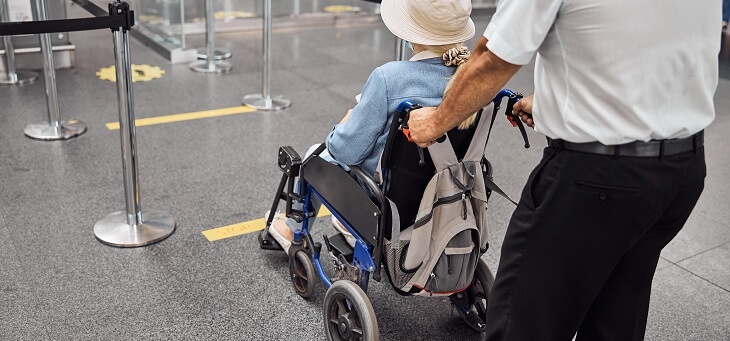We’ve come a long way as far as travel for people with a disability goes.
Almost every hotel or resort has disabled access, there is plenty of specialist accommodation and airlines accept wheelchairs, it’s discriminatory to disallow guide dogs, but there is no denying that travelling with a disability is still a challenge.
Here’s our guide to getting the best out of your next trip for people with a disability.
See your doctor
Before you put one dollar down for a holiday, consult with a health professional about the suitability of your planned trip.
Your primary physician is the best person to consult.
Read: Six common travel problems and how to deal with them
Some destinations are simply not feasible for disabled people, and specific conditions may not be suitable for specific destinations. You wouldn’t want to go to a place with high smog levels if you have respiratory issues, for example.
However, if they give the thumbs up, the next step is to navigate the health checks and vaccinations you need and work out how to manage your health while you are away.
If you have a principal carer, it’s best to involve them at this point and remember to ask for any refill prescriptions, so you don’t run out.
It may be worth doing some research into whether your destination can cope with your health condition.
A remote getaway sounds appealing, but not if you often need a sophisticated level of healthcare if something goes wrong.
If going overseas, it’s also a good idea to find an English-speaking doctor and maybe even a lawyer at your destination.
Travel insurance
If you can’t afford travel insurance, you can’t afford to travel.
You must declare your disability when you apply for insurance otherwise your insurer may deny any claims.
Insurers can’t deny you cover, as that would be discriminatory, but they will almost always charge you more, as with any other pre-existing health issue.
If you need somewhere to start, the Australian government traveller advice website smartraveller.gov.au has some good advice.
Read: Five tips to help you switch off on holiday
Take a look around
Jump on the internet and start your research. Most accommodation destinations have their own websites and photos can give a lot away about their suitability for a guest with a disability.
While many make it easy for disabled guests and claim they are wheelchair friendly for example, some will only provide the bare minimum.
Lots of stairs? Roomy restaurants? Are there leisure options for people with a disability such as wheelchair access to gyms and pools?
How will I get there?
Check if the right airline or cruise ship will meet your needs and what they will provide to support you.
Wheelchairs are generally well accepted but some medical equipment may be restricted and charging points may be hard to come by.
Medical equipment is one thing, guide dogs quite another. While it would be illegal to refuse a guide dog in Australia, other countries and foreign airlines are often not quite as understanding.
But before you even jump on a plane, remember that to take an animal overseas you may need to put them in quarantine, get them vaccinated and may need supporting documents to prove they are a genuine support animal.
And try to get as much as you can in writing. There is an acre of understanding between what someone has promised on the phone and the cold hard reality of checking in for a flight a month later.
Read: How the travel industry uses your sense of smell to enhance your holiday
Cold calling
You may have been sucked in by a glossy website, but nothing beats talking to an actual person.
Try to call ahead before you pay for any service or accommodation.
Specific disabilities may require specific solutions and a quick call could clear up any nagging doubts.
You might even discover an added service not supplied on the website, such as beach access or specialist tours, and if the hotel knows you are coming, they can be prepared with any specialist services or support.
Travel agents
A travel agency that specialises in helping people with a disability may be your best resource.
A quick internet search will unearth loads of options, many with decades of experience, some can even sort out NDIS funding for support workers.
From group holidays, family getaways to supported tours, there is a lot of experience out there for you.
And if you need any inspiration, I recommend the movie Breathe. It’s the true story of Robin Cavendish, who after being paralysed by polio, went on to pave the way for people in wheelchairs to live as normal a life as possible, including travel. It stars former Spider-man Andrew Garfield if you need any more motivation.
If you enjoy our content, don’t keep it to yourself. Share our free eNews with your friends and encourage them to sign up.

